El Salvador: The people caught up in the gang crackdown
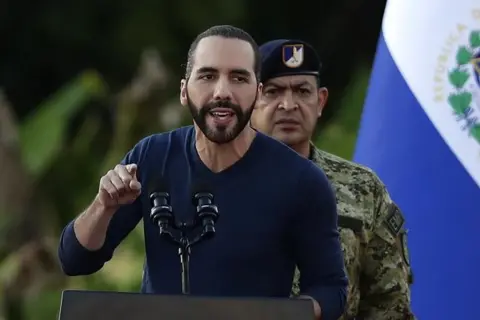 EPA
EPAWhen El Salvador's President Nayib Bukele attended a graduation ceremony for military officers last week, he brought more than just warm words for their future careers in law enforcement.
He also delivered the latest escalation in his ruthless crackdown on the country's street gangs which has seen a staggering 57,000 people arrested on suspicion of gang affiliation since March.
Yet Mr Bukele's self-proclaimed "war on gangs" has also given rise to some disturbing cases of wrongful arrest.
"Thanks to God and thanks to you, Salvadoreans have true peace", President Bukele told thousands of soldiers and police officers in a slickly produced night-time event to launch the fifth phase of his controversial "Territorial Control Plan".
Called "Extraction", it is intended to tighten the military's control of El Salvador's major cities using high-tech surveillance equipment, ostensibly to prevent gang members from coming in or out. The operation began this weekend with 10,000 members of the security forces descending on the town of Soyapango where they started rounding up alleged gang members.
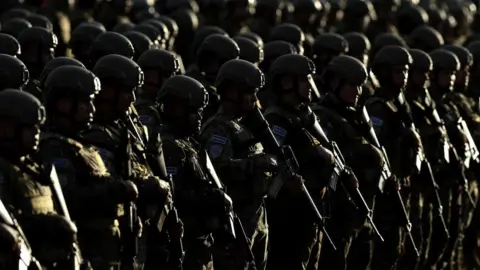 EPA
EPAPresident Bukele dismissed the concerns of international human rights organisations and foreign governments over the "state of exception" he introduced nine months ago, following a weekend of extreme gang violence in which more than 70 people were killed.
The emergency measure granted the police sweeping new powers, including the right to detain suspects without due process. Mr Bukele told the officers it was supported by more than 95% of Salvadoreans.
It is undeniably popular. Murder rates are falling to new lows. Neighbourhoods which have endured years of extortion and violence at the hands of the brutal MS-13 and 18th Street gangs are enjoying an unprecedented period of calm.
However, El Salvador's prison population is now proportionally the highest in the world. Already overcrowded facilities are heaving under the new intake, prompting the government to announce the construction of a major new penitentiary.
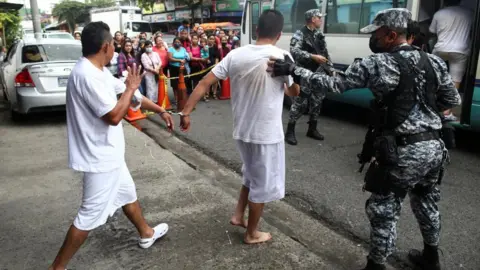 Reuters
ReutersEvidence suggests hundreds, perhaps thousands of people with no discernible link to gang crime have been caught in the dragnet.
When police officers came crashing through Zoyla Torres's front door in April, she thought they must have made a mistake.
"We don't make trouble for anyone," she insists. "My husband has nothing to do with the gangs. He works in a factory making sacks for transporting crops."
Nevertheless, the police stormed their cramped home and detained her husband Manuel and her brother-in-law while her children were eating breakfast.
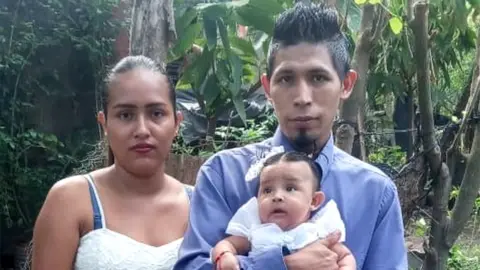 Courtesy of Zoyla Torres
Courtesy of Zoyla TorresOver the road, at her brother's house, the same thing was happening - all on the strength of an anonymous tip.
The three men spent almost a month in the harshest prison conditions in Latin America. Zoyla says that they were regularly beaten in jail and have been left traumatised by the experience.
Yet they were among the lucky ones. Zoyla managed to get them freed them after their employer provided assurances that they were not involved in gang activities.
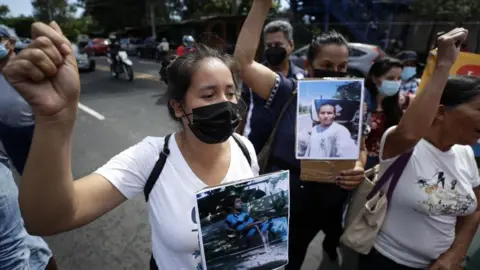 EPA
EPAMarta, an 18-year-old psychology student, was not so fortunate. Her father Oscar says that Marta - not her real name - was taken her from her home after the police tried to force her to name a gang member.
As she did not know any gang members and was not prepared to falsely accuse anyone, they simply arrested her instead, Oscar says.
"In late December she'll have been in prison for six months. They arrested her for illicit association. But they provided no proof, no evidence at all."
Oscar's attempts to secure his daughter's release - providing evidence of her enrolment in university and testimony from her church group as to her good character - have so far fallen on deaf ears.
And now Marta, like thousands of other prisoners, is facing a further six months in legal limbo as the state of exception is to be extended again this year.
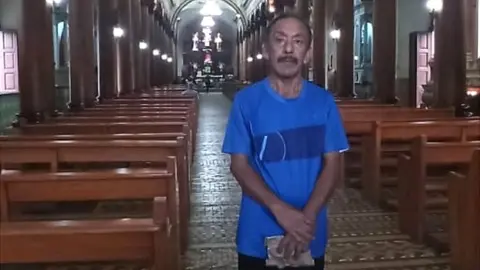 Courtesy of Oscar
Courtesy of OscarLucrecia Landaverde, a pro-bono lawyer representing scores of detainees, says that the policy is causing lasting damage to El Salvador's judicial system.
"So far, there have been involved thousands of arbitrary arrests, unfounded accusations, and illegal detentions. There haven't even been preliminary investigations to check that those arrested form part of the gang structures," she argues.
With habeas corpus all but suspended and some police reportedly justifying the arbitrary detentions as simply "the president's will", the road to full-blown totalitarianism is short, warns Ms Landaverde.
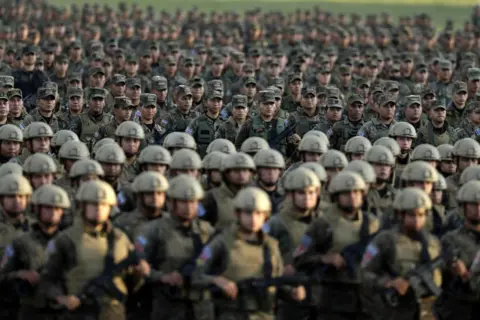 EPA
EPAThe crackdown has also targeted scores of ex-gang members too, many of whom had renounced the gang life decades earlier and were attempting to make amends for their past crimes.
Among them is William Arias, an evangelical pastor and former MS-13 member the BBC interviewed in 2018.
A tattoo of the gang's initials still visible on his forehead, William fully admitted to having carried out some heinous crimes in his youth. Yet he insisted that for 18 years, he had entirely dedicated himself to dissuading other young people from following his path into the group.
He was arrested in April, his whereabouts are currently unknown. "If he hasn't been released, he doubtless still had charges to answer," the vice-president of the National Assembly, Guillermo Gallegos, said.
"And remember, many gang members use the church as a pretext," he alleged. The staunchly pro-Bukele deputy has repeatedly advocated for the death sentence for El Salvador's gang members.
"The gang members never cared less about their victims' human rights," says Mr Gallegos, echoing the president's line. "So, now we consider their human rights to be reduced to the bare minimum."
Meanwhile Oscar fears for his daughter's life.
"They're not interested in whether people are innocent or guilty," he says, his voice cracking. "What they're interested in is a high number of arrests for publicity. Just for show."
